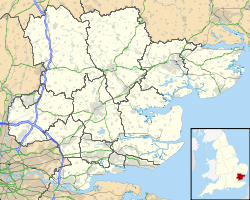| Old Harlow | |
|---|---|
 High Street, Old Harlow | |
Location within Essex | |
| Population | 5,845 [1] |
| OS grid reference | TL475115 |
| District | |
| Shire county | |
| Region | |
| Country | England |
| Sovereign state | United Kingdom |
| Post town | HARLOW |
| Postcode district | CM17 |
| Dialling code | 01279 |
| Police | Essex |
| Fire | Essex |
| Ambulance | East of England |
| UK Parliament | |
Old Harlow is the old town area of Harlow, in Essex, England. It was the historical town centre prior to Harlow being designated a new town in 1947 during the new towns in the United Kingdom movement.
Contents




Old Harlow is situated in the north-east area of the town and is the oldest area of the town. Old Harlow pre-dates the first written record in the Domesday Book of 1086, so it is unknown when the town first came into existence. Originally Old Harlow was going to be the central area of Harlow New Town, but due to the amount of demolition works and the loss of agricultural land it was decided to build Harlow New Town to the west of Old Harlow. As the new town was being built, Old Harlow seemed to be forgotten and fell behind in its development. It was not until 1977 that Old Harlow was improved with the building of a health service and a senior citizens day centre. Old Harlow still remains village-like with two Grade I listed buildings and many Grade II listed buildings.
Old Harlow ward has a total population of 5,845 and comprises 2,498 homes. [1]

